As promised in Part 1, here is part two of “How to be Sustainable as a Student”! Beyond the small daily changes that one can make to lead a sustainable lifestyle as discussed in my previous blog post, there is so much more you can do to create bigger, even more positive changes in your life.
The first is reducing your food waste. We are currently excessively wasting too much food and using too much water in the UK. Believe it or not, here are some surprising UK food waste figures:
- The UK wastes around 7.1 million tonnes of household food waste.
- The food industry throws away an additional 1.9 million tonnes each year.
- Even more surprisingly, over 8.4 million people in the UK struggle to afford food on a daily basis.
To counter this, The Waste and Resources Action Programme (WRAP) is suggesting that each person in the UK must reduce their annual food waste production by 156kg each year to reach the UK 2025 target (WRAP, 2015). Sounds like a lot I know, but break it down and this means reducing your food waste by 400grams each day, which doesn’t sound too bad (to me at least).
So how can you be even more sustainable?
The answer is a simple but difficult one to execute every day- consume less and save more. Here are 5 tips that worked for me, and hopefully this will work for you as well!
1. Buy less, but buy better quality food
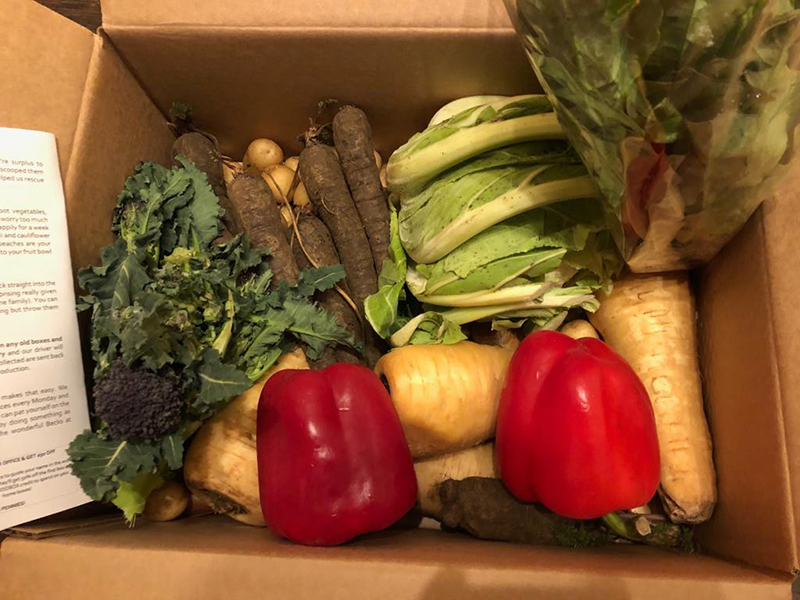
This may not be an option for everyone, but my fiance and I started using a weekly organic food delivery service. It has been really great for us. We no longer buy packs of non-organic/non-seasonal tomatoes or leeks shipped from outside the UK and packaged in plastics. Instead, we now buy locally grown fruits and vegetables delivered loose in a reusable cardboard box. For a box with 7-8 different types of seasonal fruit and veg, it costs between £11-20 per week depending on how much you wish to get delivered. It seemed expensive for me at first for the amount I received. I was getting my fresh produce from Aldi in the past (it’s cheap, I know). But I realized that I was wasting a considerable amount of food each week. Like overly ripe bananas that became too soft, the soup I never made with those fresh tomatoes and the berries that just got too old from me “saving” it for another time. So by switching to a delivery service that may have seemed a bit more expensive, I ended up reducing a lot of my food waste, money, and time. I now spend a lot less time in the grocery store and on what I want to cook. Now I am forced to cook with the ingredients that get sent in my box each week. AND, I am now eating organically and locally produced fruit and vegetables. Which is much better for my health and the environment, so a total win-win!
2. Use every bit of your fruits and veg
The most commonly wasted parts of some vegetables and fruits are its peel. Which happens to be one of the most nutritious parts! If you have good quality organic produce, I definitely recommend washing them well with a brush under warm water. That way you can eat both the flesh and skin. I use my old bamboo toothbrushes that I keep separate just for this. Many fruits such as kiwis (yes, I said kiwi!) can be enjoyed with the skin on. And the same goes for most, if not all vegetables!
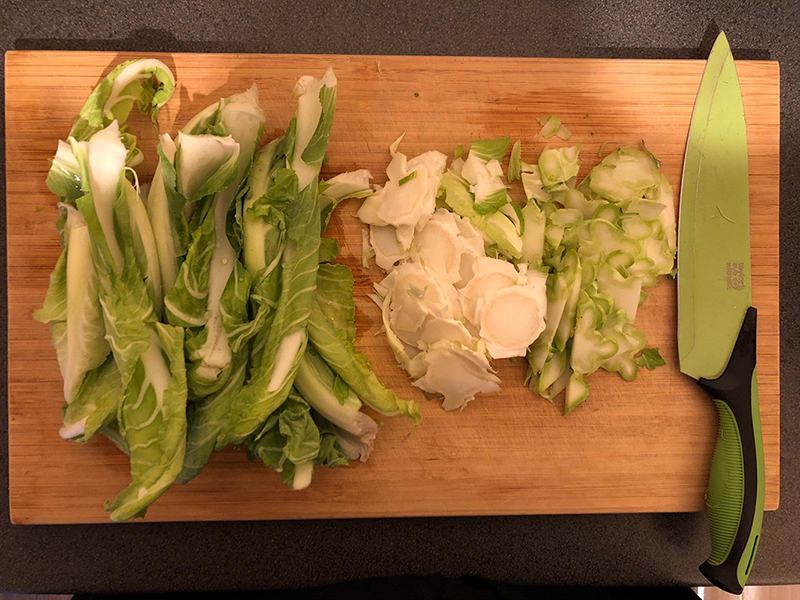
There are also different parts of a vegetable that we discard thinking it isn’t edible such as carrot, celery, and cauliflowers leaves or the stems/stalk of herbs like basil and parsley! I would say that most leaves of common vegetables are completely safe to consume. The only leaves you should avoid at all cost are rhubarb leaves. Carrot leaves are so beautifully fragrant with a slight peppery kick which makes them perfect for making pesto with a twist! Cauliflower leaves are hardy like cabbage so they make great alternatives for making fermented products such as sauerkraut or kimchi. There are also leaves from beetroot, radish, or celery which can add variety to what would otherwise be a boring iceberg lettuce salad! We also typically waste The stems of broccoli and cauliflower. But they too can be enjoyed in the same way you would cook the florets. Alternatively, they go really great with hummus if you can’t be bothered to cook them. Same goes with most soft herbs. The stems are perfectly fine to eat and adds a nice texture to whatever you are cooking.
3. Be smart and sustainable with how you go food shopping
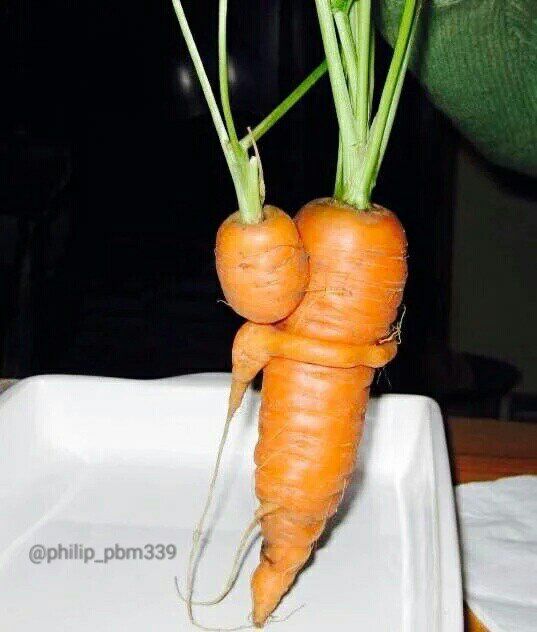
There are too many 2-for-1 deals in the supermarkets that lead to a lot of household food waste. Don’t become victim to insanely clever marketing and purchase only the food you need. The better “deals” are sometimes worse for the environment and your bank account in the long run. Check the expiry date of animal-based products such as meat or dairy. This will give you more time to finish using the ingredients if you are keeping them in the fridge. You can also get “wonky” or “ugly” veg these days to reduce wastage from vegetables that didn’t make it to the supermarkets’ insanely high and strange standards of what food should look like! I am not a vegan or a vegetarian (yes, you can still care for the environment and not be a vegan!). So when it comes to meat I like to purchase meat products reduced due to expiry date proximity. I then freeze these expiring meats as soon as I get home. That way, I get to save money and prevent these wasting of those animal products in the supermarkets.
4. Grow your own veg at home
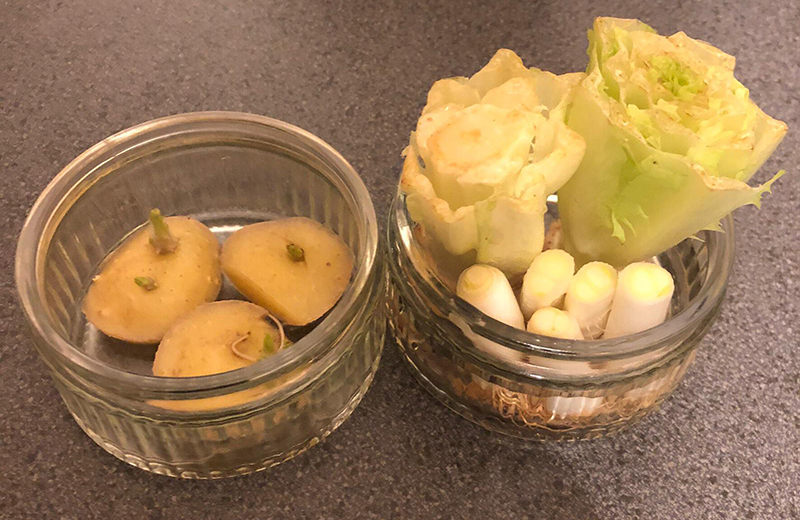
Ever been in a situation where you have an old garlic clove or potato that has started sprouting? Why not stick them in a pot with some soil and start growing your own veg? This is a really great way to reduce the amount of food we waste. Plus some veg like carrots, sweet potato, and turmeric make really pretty house plants. This also really boosts mental well-being, so it’s another win-win!
5. Preserve your veg through fermentation
[youtube https://www.youtube.com/watch?v=vShN27-07XE]
Have a lot of carrots or cabbage left? Why not become a scientist in your own kitchen and ferment your leftover veggies? Fermentation is the oldest method of food preservation that also happens to add so much nutrition to your diet too. There are many simple recipes online to practically ferment any type of fruit or vegetable. Most of the time all you need is a clean jar, salt, and your fruit or veg of choice. So fermentation is a cheap, easy, healthy and sustainable way of reducing food waste at home. Plus, it’s super fun to make as well!
There are many other sustainable techniques you can use at home to reduce household food waste but these are the methods that have really helped me and I hope this inspires you to try them out yourself!
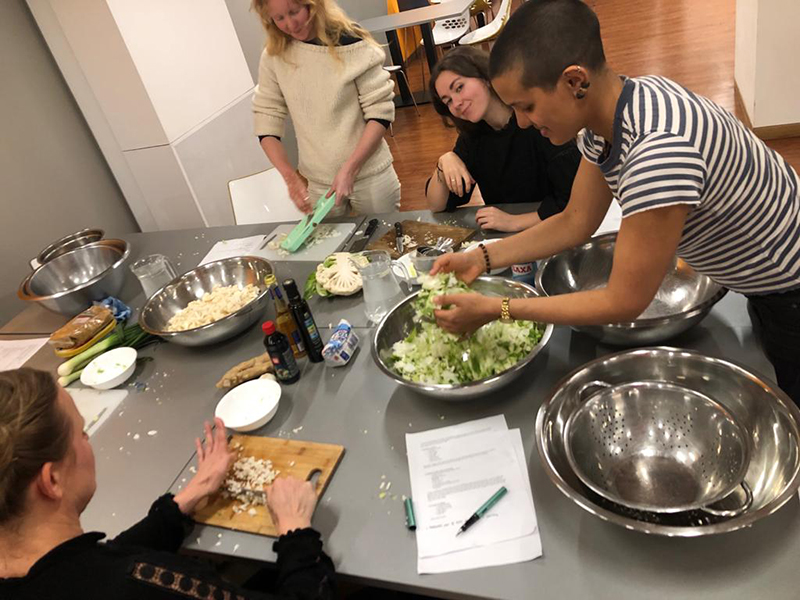
Big change only comes from making many small changes, and you have the power to start making these small changes as well for a more sustainable lifestyle.
Thanks for reading.
Grace
Instagram: @environmentalsoc
For more blogs from Grace post and other blogs from International Students at Westminster please visit International Student Blogs.
- Health Measures in London: Covid-19 - September 4, 2020
- 5 Tips to Keep Your Mind and Body Healthy During Quarantine - April 3, 2020
- How to be Sustainable as a Student: Part 2 - March 25, 2020
